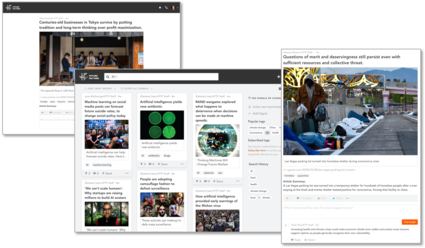Future Now
The IFTF Blog
Future Factors: Flex Your Foresight Muscles with IFTF's Signals Database
Signals gathering lies at the heart of every good futures practice.
And the more diverse the community, the better the signals.
Future Factors, IFTF's proprietary emerging signals platform, combines a rich trove of
real-time signals-scanning with a moderated futures thinking community.
One of the most common questions our organizational partners ask us when beginning their foresight journey has little to do with methodologies or literacies, and everything to do with motivation:
How can we get our internal stakeholders to care about foresight—on an ongoing basis?
It’s easy to generate initial enthusiasm about the strategic possibilities of foresight. Everyone wants better tools to anticipate what’s coming, to be ready for the next wave of opportunity or disruption. But how do you make foresight a priority day after day, for teams whose near-term concerns, goals, and incentives are constantly pushing their attention back down to what’s most urgent to get through today? How do you make foresight stick in a world driven by short-term cycles?
It’s a fair question, and one that has many answers. The big intimidating answer is that you need to cultivate a culture of foresight that runs across the entire organization. The manageably actionable answer is that you start with small, replicable foresight interventions that repeatedly flex your colleagues’ foresight muscles and chip away at the temptations of short-termist interpretations. For many teams, this begins with a signal scanning club.
Signal scanning is the bedrock practice of foresight practitioners.
 Without any concrete facts about the future to draw from, signals form the evidence basis for identifying possible, plausible, and preferable futures. Signals help us contextualize how macro drivers may show up in the form of new assumptions, behaviors, and experiences. From clusters of signals you can build forecasts about future possibilities, and develop immersive scenarios of plausible future worlds. It all starts with signals.
Without any concrete facts about the future to draw from, signals form the evidence basis for identifying possible, plausible, and preferable futures. Signals help us contextualize how macro drivers may show up in the form of new assumptions, behaviors, and experiences. From clusters of signals you can build forecasts about future possibilities, and develop immersive scenarios of plausible future worlds. It all starts with signals.
And the good news is that signals are deeply intuitive and broadly accessible for diverse groups of people. The most important work of signal scanning comes not from having world-class experts constantly mining the fringes for transformative concepts (though that certainly doesn’t hurt). It comes from communities of regular people working together to identify and articulate the future possibilities contained within their daily interactions, observations, and news diets. Signal-scanning primarily represents a mindset shift, one that anyone can make by practicing with others over time.
A signal scanning club doesn’t need to be something expensive
or hugely time-consuming to get off the ground.
It does benefit greatly from at least one champion to drive the process forward, but to make progress toward the big unwieldy goal of culture change, it just requires a team with a latent interest in foresight and 15 minutes of available mental time in any given day—time enough to take a piece of information that doesn’t fit existing mental models and assumptions, and instead of rejecting, it consider where that new information might lead in the future. Once a month, quarter, or year, the signal club can come together for an hour or two to discuss the signals they’ve been collecting and sharing. These sessions tend to be very energetic, as teammates build on each other’s observations and insights, and begin to recognize the unique strengths and passion areas of the budding futurists in their midst. From a conversation like this comes a spark for a pilot or future investment that the organization should consider. And before you know it, foresight has crept irreversibly into the way you plan and make decisions.
IFTF Vantage developed Future Factors, our online signal-scanning platform, to make this habit easy, stimulating, and enjoyable. Our signals platform was born out of an internal need to have better purpose-built tools for organizing and sharing signals over time. When you want to add a signal to Future Factors — perhaps when you’re reading the news during your morning cup of coffee, or trying to make sense of your teenage niece’s new social media obsession — all you have to do is click the “Add Signal” button and enter the URL of the article, study, or product page you'd like to share. Future Factors takes in all the relevant information about that link, and asks for just two pieces of additional context: how should we tag this signal so others can find it later, and what does it suggest about new future possibilities?
With just thirty seconds of effort, the signal is shared on the Future Factors network, either in the public feed of IFTF researchers and cross-sector foresight practitioners, or in the private signal-scanning clubs of our organizational partners. The contributed signals are organized and categorized for quick retrieval when an individual or team has a relevant project. They’re also pre-packaged for discussion at a scan club meeting, making interventions much easier to organize and plan.
We’ve found that people who use Future Factors for a little while end up using it all the time.
Once you start working that foresight muscle, it becomes second nature. Before you know it you’ll be evangelizing the benefits of your new perspective to others. Signal scanning is empowering and contagious. And it all starts with a small shift in perception, and a regular practice of instilling that new mindset in your daily routine.
Interested in learning more?
IFTF Future Factors is brought to you by IFTF Vantage, Institute for the Future's strategic partnership helping organizations become future-ready.



